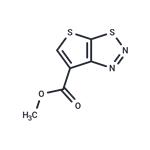Description
1,2,3-
Thiadiazoles have diverse applications in medicine and agriculture, such as bactericides, fungicides, and antiviral agents. 2,3-
dihydrothieno-
Thiadiazole carboxylate (MTCC), 100 μM, both inhibits and inactivates certain microsomal CYP450 enzymes (CYP2E1 and CYP2B4), but not others (CYP1A2), with inactivation occurring in a mechanism-
based manner.
in vitro
as a 1,2,3-thiadiazole analog, 2,3-dihydrothieno-thiadiazole carboxylate could both inhibit and inactivate certain microsomal cyp450 enzymes (cyp2e1 and cyp2b4) at 100 μm, but not others (cyp1a2). moreover, p450 2e1 was significantly more sensitive than p450 2b4 to mechanism-based inactivation by 2,3-dihydrothieno-thiadiazole carboxylate when compared by the difference in partition numbers and inactivation rate constants. inactivation rate constants (kinact) determined from plots of 1/kobs versus 1/[i] were 0.08 for 2e1 and 0.04 min-1 for p450 2b4, with kis of 0.1 and 2.0 mm, respectively. the difference in the oxidation of the monocyclic and bicyclic thaidiazoles might account for the ability of 2,3-dihydrothieno-thiadiazole carboxylate to function as a mechanism-based inactivator [1].
References
[1] babu, b. r. and vaz, a.d.n. 1,2,3-thiadiazole: a novel heterocyclic heme ligand for the design of cytochrome p450 inhibitors. biochemistry 36, 7209-7216 (1997).
![methyl thieno[3,2-d][1,2,3]thiadiazole-6-carboxylate Structure](https://www.chemicalbook.com/CAS/20180711/GIF/152467-47-5.gif)
